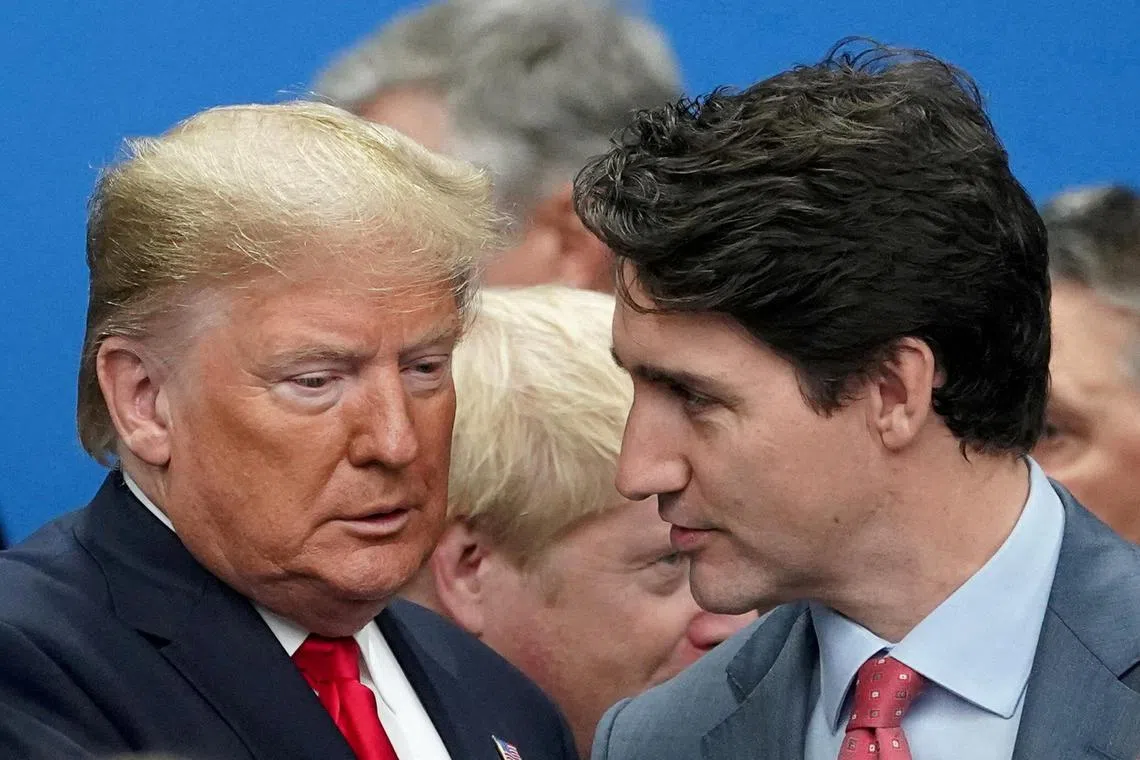Trump’s Canada fixation – an expansionist dream
Sign up now: Get ST's newsletters delivered to your inbox

Canadian Prime Minister Justin Trudeau (right) vowed that Canada would not be annexed, after US President Donald Trump made his expansionist desire known.
PHOTO: REUTERS
WASHINGTON – A savvy negotiating tactic? A wild fantasy? A greed for natural resources?
US President Donald Trump’s fixation with annexing Canada
“I think it’s one of those things where Trump thinks it would be nice to pull it off, but he understands that it is less than a remote possibility,” said Dr Todd Belt, a political science professor at George Washington University.
“His rhetoric is mostly to take a tough and unpredictable bargaining stance.”
On March 11, the 78-year-old Republican who in recent weeks all but launched a global trade war made his expansionist desire known, once again, on his Truth Social network.
“The only thing that makes sense is for Canada to become our cherished 51st state,” Mr Trump wrote, painting a bright future of lower taxes, no tariffs and security for Canadians.
33 per cent support
Citizens of Canada are appalled by Mr Trump’s annexation talk.
“What he wants to see is a total collapse of the Canadian economy,” outgoing Prime Minister Justin Trudeau said last week shortly before leaving office, after Washington announced 25 per cent tariffs
Mr Trump’s statements have fuelled strong anti-US hostility north of the border, where the American anthem now gets regularly booed at sports competitions.
According to an opinion poll conducted by the Leger Institute in March, only 33 per cent of Canadians have a positive opinion of the United States, compared with 52 per cent in June 2024.
In the same poll, 77 per cent of respondents said they have a positive view of the European Union.
In his Truth Social post on March 11, Mr Trump called the US-Canada border an “artificial line of separation drawn many years ago”.
Addressing Canadians, he said that when the border disappears, “we will have the safest and most beautiful nation anywhere in the world – and your brilliant anthem, ‘O Canada’, will continue to play, but now representing a great and powerful state within the greatest nation that the world has ever seen!”
Mr Trump seems to have a fondness for cartography, as manifested by his order, issued shortly after his inauguration, that the Gulf of Mexico be renamed the Gulf of America.
He has also publicly threatened to lay claim to Greenland take back control of the Panama Canal
“A lot of this territorial aggrandisement (Greenland, Panama, Canada) came after the election, and I think someone put it in his head that great presidents acquire territory as a legacy,” said Prof Belt, the political scientist.
In his speech last week, Mr Trudeau vowed that Canada would not be annexed.
“That is never going to happen,” he said. “We will never be the 51st state.”
Waterways
According to a New York Times report, Mr Trump used the opportunity of talks with Mr Trudeau in February to question the validity of a 1908 treaty that established the border between the two countries.
The US President, who is known to take a keen interest in water resources, also reportedly criticised the agreements regulating access to water between the two countries.
To the east, the US-Canada border runs through the Great Lakes. Westward towards the Pacific coast, the border crosses the Columbia River, whose waters are regulated by a detailed international treaty.
A trade war between the US and Canada, which are closely linked economically, would represent “an existential threat” to Canadians, Dr Ian Lee, an economics professor at Carleton University in Ottawa, told AFP.
“But no matter how much we scream or yell or express our anger, it doesn’t change the reality,” said Dr Lee. “We are the mouse and they are the five-tonne elephant. We must develop a compromise and deal with the demands of the US.”
Canada’s Prime Minister-designate Mark Carney does not share that fatalism.
“Let the Americans make no mistake: In trade, as in hockey, Canada will win,” he said on March 9.
Ottawa on March 12 announced new tariffs on certain American products


